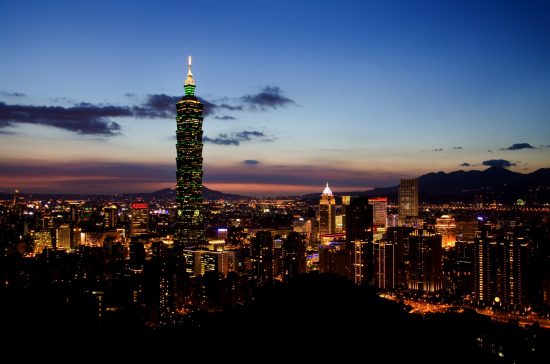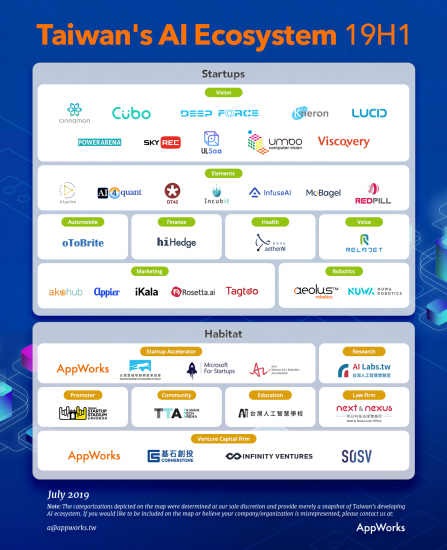
Natalie Lin, Analyst (林楓 / 分析師)
Natalie is an Analyst covering AppWorks Accelerator and Greater Southeast Asia. Before joining the team, she worked in the search engine marketing and email marketing teams at Zappos, America’s leading shoes and fashion online retailer, where she primarily focused on KPI management, campaign optimization, and project management. Born in Canada and raised in the Middle East, Natalie returned to Taiwan for high school before moving to the US for college and work. She received her Bachelors of Marketing at Case Western Reserve University in Cleveland, Ohio. Outside of work she likes to read, travel, and play video games.
In the past two years, Taiwan has been rapidly catching up to the global AI wave and is quickly becoming the region’s defacto AI talent hub. To inject greater momentum into Taiwan’s industries, the government rolled out the AI Taiwan Action Plan in 2018, a comprehensive industrial plan to accelerate innovation and development. The four-year action plan will be jointly implemented by the Ministries of Economic Affairs, Education, Labor, and Science and Technology with a total budget of over US$1 billion poured into the project. At the same time, the Asia Silicon Valley Development Plan was launched to incorporate AI into key development areas such as transportation, healthcare, telecommunications, logistics, and other smart city initiatives.
With healthy and natural conditions, Taiwan has gradually become an AI hub of Greater Southeast Asia (Taiwan + Southeast Asia). In the past two years, technology giants such as Google, Microsoft, and IBM have announced the establishment of their largest Asian R&D centers to be based in Taiwan. For example Google, following the acquisition of HTC’s handset division in January 2018, received a total of 2,000 engineers, designers, and professionals, followed by the launch of “Intelligent Taiwan” three months later. The first phase of this initiative was announced to recruit over 300 AI engineers and train 5,000 AI talents in Taiwan. The second and third phases are to empower more Taiwanese to participate in the digital economy by offering free training courses, while overall cultivating a future-ready workforce in the AI era. Microsoft and IBM have since announced that hundreds of AI engineers will be recruited from Taiwan as well.
Compared to other major Greater Southeast Asian countries, Taiwan has two advantages: AI talents and an industrial environment. In terms of talent, Taiwan produces more than 10,000 graduates of computer-science degrees and 25,000 electrical engineers to the workplace every year. A relatively sizeable talent pool that, if properly upskilled, can provide incredible value to the broader AI community in GSEA. According to OECD statistics, Taiwanese students topped the global rankings in fourth place for STEM, therefore, whether it’s the quantity or quality of talents, the level of Taiwan AI engineers has a comparative advantage compared to the rest of the region. In addition, over the past 30 years, Taiwan has accumulated an unparalleled foundation in hardware manufacturing, leaving ample opportunities for companies to capitalize on the growing integration of hardware and software, especially when it comes to 5G, IoT, big data, and industry 4.0.

New Opportunities Abound as Digital Marketing and E-Commerce Mature
According to AppWorks’ newly released 2019 first half version of Taiwan AI Ecosystem Map, Taiwan’s AI ecosystem has been shaping up well with 28 startups & 12 habitat providers. AI startups have been segmented into computer vision, elements, automotive, fintech, healthcare, voice, marketing, and robotics. AI habitats have been classified into accelerators, research hubs, promoters, community builders, education, legal, and VCs.
Taiwan’s earliest investment in the AI field can be traced back to Tagtoo, which was established in 2010 and specializes in marketing tech. In addition to capturing the Taiwan market, Tagtoo has also actively expanded into a Greater Southeast Asian regionalcompany. In 2018, it won the Best Brand Award in Indonesia by CMO Asia. Tagtoo currently aggregates all their data and has a full-time AI team dedicated to train models to more effectively optimize marketing campaign decisions for their clients.
Behind the rapid rise of Tagtoo, Taiwan’s digital marketing and e-commerce development has moved into the AI era, and has spawned a number of new innovations in the field of digital marketing and advertising. For example, Appier, which provides AI-driven data analytics and marketing solutions, recently closed their Series C round, having now received more than US$82 million in total funding. Other well-known marketing-related startups in Taiwan include Rosetta.ai, which provides e-commerce personalization modules, and Akohub, which develops retargeting chatbots.
AI Technology Startups Converge with Taiwan to Create Synergy
Notably, we’ve also witnessed the increasing integration of hardware and software, specifically as it relates to marrying Taiwan’s traditional manufacturing prowess with its growing AI capabilities. Established in 2014, Umbo CV (Umbo Computer Vision) is a model of this innovation and has successfully entered the European and American markets with loyal enterprise clients in over 30 countries. Umbo CV specializes in intelligent security monitoring and develops image recognition technology with self-learning and analysis capabilities. The software platform can be used to learn and identify objects, cars, animals, and plants, as well as monitor for intruders and special events like fires. By combining AI technology with their own proprietary cameras, Umbo CV helps automate what has traditionally been a very labor-intensive industry riddled with false alarms, saving invaluable time and resources for surveillance and monitoring companies.
Other startups that utilize the integration of software and hardware, the development of AI applications, and big data from cameras and WiFi measurement include SkyREC, which develops a big data and business analytics system for physical retailers; Cubo, the first AI smart baby camera; Lucid, which partnered with VIA Technologies to produce Edge AI 3D suite; oToBrite, which develops self-driving assistance systems; and Aeolus and NUWA Robotics, which develop AI robots.
With more and more AI innovations, Taiwan is also booming in terms of startup accelerators, education, and research. The accelerator section includes AppWorks Accelerator, which was first established in 2010 and is now limited to recruiting only AI / blockchain startups since August 2018 (AW#17); Microsoft for Startups which provides startups support for Azure; Taiwan AI x Robotics Accelerator; all of which are accelerators recruiting for AI teams. The Taiwan AI Academy and Taiwan AI Labs are Taiwan’s representative institutions in the field of AI for education and research respectively.
Looking into the future for AI innovation, we believe that there are three opportunities related to startups. The first is the automation of routine and repetitive work in labor-intensive industries such as law, accounting, and healthcare. The second is the use of AI to facilitate tasks that would otherwise be impossible or highly inefficient for humans to do such as processing large amounts of data for personalized recommendations en masse. The third is the development of enabling tools to help users capitalize on the growing ubiquity of AI without any prior technical foundation.
Apart from conducting primary research, we used information from our own respective networks, communities, and investment partners, and pored through local and international news. The map will be updated every half year to adequately capture the sheer pace at which the industry is evolving. We made our best effort to include everyone but if you feel you’ve been missed out, let us know.
Disclosure: AppWorks is a fully independent venture capital fund/startup accelerator and is only affiliated with several of the listed startups, which previously went through our equity-free accelerator, and Umbo CV, which we’ve invested in.
The Taiwans’s AI Ecosystem Map was produced by AppWorks. Moving forward, we will be updating it every 6 months. For any questions or comments, please email [email protected]
【If you’re a startup currently or prospectively employing AI / IoT or Blockchain / Crypto, be sure to apply AppWorks Accelerator’s AI & Blockchain only batch.】
Photo by shutterbean on Pixabay